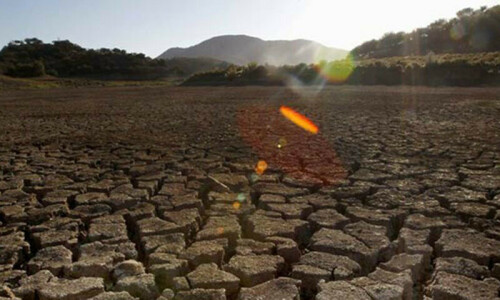ISLAMABAD: The Supreme Court has ordered the federal government to set up an authority under the Pakistan Climate Change Act, 2017, within a fortnight and complete the establishment of funds intended to address the dangers of climate change.
“Considering that failure to establish the authority has serious implication on the fundamental rights of the people of Pakistan, we direct the federal government to establish the authority within a fortnight and thereafter complete the establishment of the fund,” said an order issued by a three-judge Supreme Court bench the other day. The bench consisted of Justice Syed Mansoor Ali Shah, Justice Muhammad Ali Mazhar, and Justice Athar Minallah
The bench had taken up a petition filed by the Public Interest Law Association of Pakistan through Advocate Syed Faisal Hussain Naqvi, which had highlighted the existential threat that climate change poses to the country.
At the last hearing held on March 21, Attorney General for Pakistan Mansoor Awan had assured the court that a council meeting under the act would be held within a month to address questions regarding the establishment of the authority, as well as the fund.
The AGP explained that the council meeting was held on April 26, 2024, and a summary has been put up by the minister in charge, Ministry of Climate Change for the establishment of the authority, but the authority has not yet been established.
“We understand that the climate change is the most serious existential threat to the people of Pakistan, and considering that the climate act was promulgated seven years ago, neither the authority nor the fund has been established so far.”
During the hearing, Additional Advocate General Syed Kauser Ali, representing Khyber Pakhtunkhwa as well as Sindh and Punjab, said that they have submitted their strategies regarding climate change.
Regarding Balochistan, the director of climate change submitted that the summary has been put up before the cabinet, and a report to this effect has been placed on record. However, the court decided to resume the hearing again on June 3.
On March 14, Justice Shah had asked the federal government to come up with a report highlighting the initiatives it took to cope with the challenges of climate change in Pakistan, in wake of the massive devastation caused by catastrophic floods in 2022.
Considering the critical importance of the Pakistan Climate Change Act, 2017 (Act), was promulgated on March 31, 2017, with the objective of providing comprehensive adaptation and mitigation policies, plans, programmes, projects and other measures required to address the effects of climate change.
Justice Shah also recalled how the devastation caused by the catastrophic floods in 2022 was a distressing proof of the complexities of climate change, which caused a total damage of Rs3.2 trillion, a total loss at Rs3.3tr and total needs for recovery and reconstruction at Rs3.5tr.
According to the Global Climate Risk Index, Pakistan is currently the fifth most climate-vulnerable country in the world, the Supreme Court observed, adding that Pakistan was also facing some of the highest disaster risk levels in the world and ranked 23rd out of 194 countries as per the 2024 Inform Risk Index.
This risk is driven particularly by the nation’s exposure to flooding, earthquakes, tropical cyclones and their associated hazards. It is these alarming statistics that underscore the need to address climate change and mitigate its effect on people and their livelihoods, the Supreme Court emphasised.
The judge added that while developing countries like Pakistan may not be the primary contributors to climate change, acknowledging and confronting its fallout was indispensable, especially for combating the high risks posed by climate change.
Published in Dawn, May 11th, 2024













































